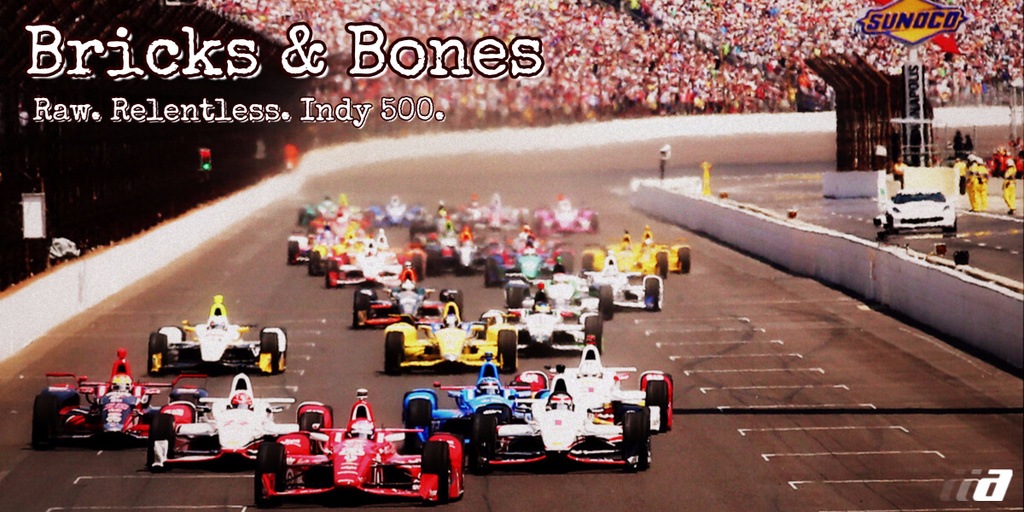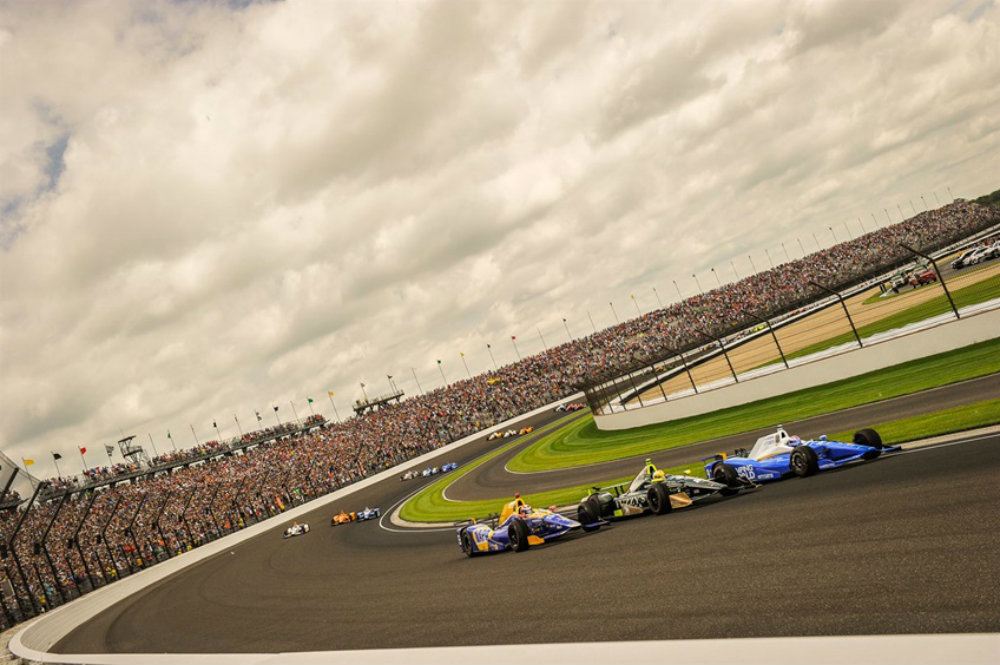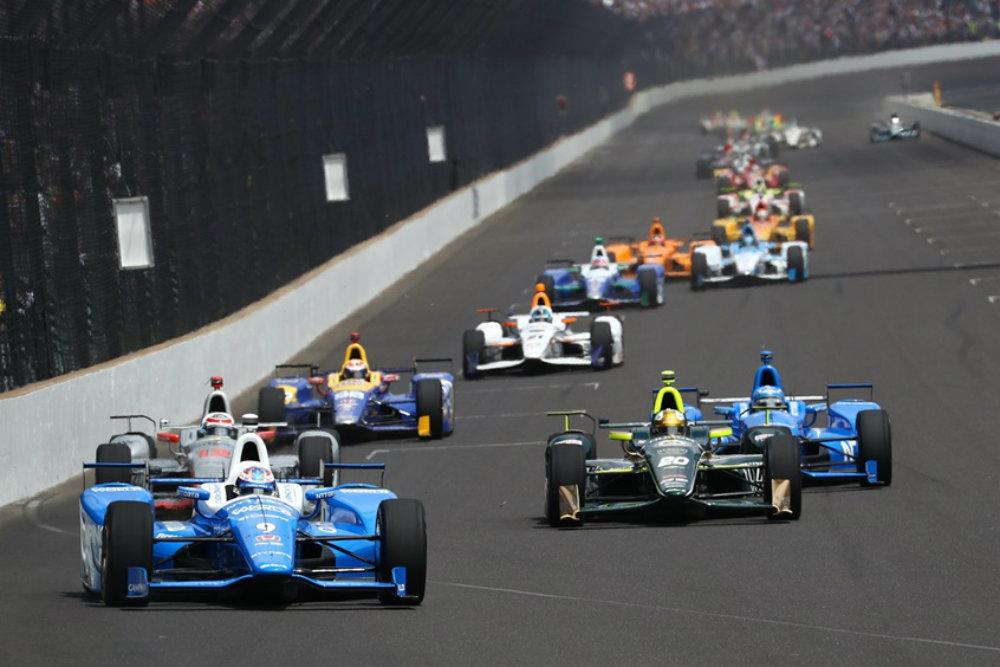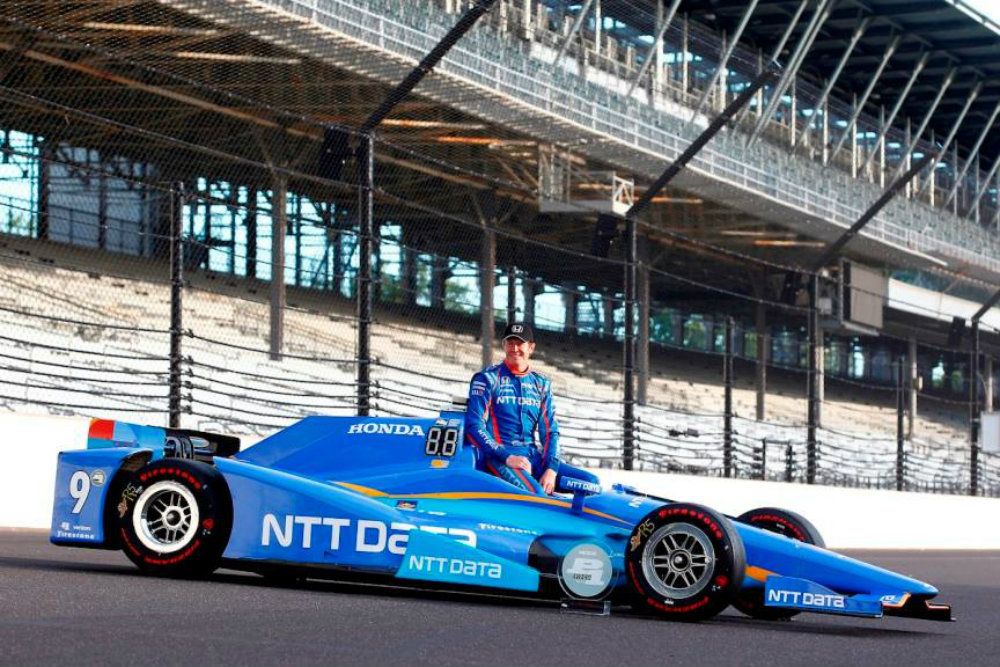Tony Borroz attended the 101st Running of the Indianapolis 500 on Sunday, May 28th, 2017. This series, Bricks And Bones, explores the cultural significance, endearing legacy, and the nitty-gritty phenomenon of The Greatest Spectacle in Racing.
The prologue of this series here.
Chapter 1: Real Wrong here.
Chapter 2: St. Elmo’s Fire here.
Chapter 3: The Quiet Racer here.
Chapter 4: Hang Ten here.
Chapter 5: Female Perspective here.
Chapter 6: The Fearless Spaniard here.
Chapter 7: Speedway Legends here.
Watching the Indy 500 from my perch in the top floor of the press center was interesting. At first, I was surprised at how professional all the drivers were. They dropped the green flag and they all snarled off into turn one with seemingly little drama.
It was sort of like standing by the barrel of an enormous shotgun that was fired every 40 seconds or so.
Quiet Sunday
For the longest time, the laps just clicked off. Nobody did anything stupid. There were no gonzo dives for the inside, no low percentage moves that were doomed to failure. The racing was just as clean as could be. The first round of pit stops were largely the same way. My spot was directly behind Simon Pagenaud’s pit box and a little off from where Hélio Castroneves was. It was amazing to watch the Penske pit crews do their jobs with flawless precision.
The press center is a four story building right next to The Panasonic Pagoda, the tall timing and scoring tower. The top is a glass box that can easily accommodate 125 members of the press. There are screens everywhere, and we got the direct audio feed from race control so we knew when they’d throw yellow flags, and when they’d go back to green.
About half the press stayed at their desks – long rows of tables with power and data hook ups – either banging away on laptops or staring at the TV feed on the screens. The rest of us were lined up along the windows, watching the cars, now broken up into packs of 8 or 10, blasting down the straight, over the yard of bricks, and into turn 1 doing 230 or so. Then as the cars zoomed out of sight, we would all turn to the screens and watch until they came back around again.
Airborne Assault
This was our rhythm until, on lap 53, backmarker Jay Howard either drifted up into the gray exiting turn 1, or was pushed up there by Ryan Hunter Reay (it depends on who you ask). He slithered up into the outside wall, then slowly slid back down the track directly into the path of oncoming traffic. The main pack had already blown by us, so everyone in the media center was watching the screens when a minor screw up turned into a very bad day.
Howard’s car, now damaged beyond control in the initial impact, slid back down the track and nearly missed Tony Kanaan’s #10 Honda powered entry. This caused a collective exhalation from the assembled press. But now Howard’s car was pretty much in the middle of the track, grinding to a halt directly in front of the oncoming Scott Dixon who was powerless to do anything but ram Howard at around 225 mph.
Everyone in the press room let out a “ohhhh-ahhhhAAAAAHHHHH-OH!” as Dixon impacted Howard’s car and was flat out launched like a low angle mortar round. Dixon, a highly personable and perennially grinning Kiwi, arced through the air, reaching an apogee of around 25 or 30 feet. Helio Castroneves appeared on the scene doing well over 200 miles an hour, and dove for the last open space, which was directly under Dixon’s car, mid-parabola.
Tumble & Fall
Dixon’s car was in a corkscrewing tumble by the time he was on his way down, starting to do a neat full barrel roll as Helio scooted under. His downward arc was a perfect illustration of geometry and physics until all hell broke loose. Dixon clipped the inside catch fence, started to tumble, and came down half-sideways/half-upside down onto the inside wall, directly onto his open cockpit.
This caused the assembled press to fall into what I can only describe as inchoate screaming as Dixon’s car literally ripped itself in half. The press room seemed to explode with monosyllabic gibberish. We were all educated racing journalists. We all knew, usually first hand, what the cost of this sport could be.
Now it was very hard to know where to look. Shrapnel was flying everywhere. The entire rear end of the car – the transaxle, rear suspension, brakes, uprights, wheels, and tires – all sheered completely off and slung back towards the outside wall in a terrifying kinetic twist, narrowly missing oncoming cars. Dixon’s car continued its high speed tumble, each bit of rotation shedding more and more pieces. Finally, the car came to rest, sitting upright, rendered down to the tub, and with the left front suspension and wheel still attached. The engine, which everyone at first thought had been sheered off, had actually been compressed forward by one of the multiple impacts, tamping it fully into the fuel tank, which miraculously remained intact and did not rupture.
As the car came to rest, the safety crews were already rolling up and, astonishingly, Scott Dixon unbuckled his belts and climbed from the cockpit. What can only be described as a roaring silence filled the press room. Had the car rotated another 10 degrees at most, it would have struck the top of the retaining wall flat on, and no doubt torn Dixon apart or decapitated him or both.
Miracle In Indy
Our stunned silence gave way to wild urgent question of those closest to you; “what did you see? what did it look like?” As the multiple replays rolled on, everyone was gasping and shaking their heads and muttering to themselves and one another. The replays showed that not only had Dixon really clobbered the inside wall, but his car had grabbed the debris fence like a giant hand, sweeping it aside like a curtain.
Dixon was checked and, somehow, released without any significant injuries minutes after the accident. Miraculous doesn’t even begin to describe this outcome. Every time I see the replay it seems like there are a dozen times Scott Dixon should have died. I looked at an older, grizzled sportswriter standing next to me and asked, “what’s the Powerball lottery up to?”
“What!?” was his incredulous response.
“If I was Dixon, I’d by a lotto ticket on the way home tonight,” was my answer.
Tony Borroz has spent his entire life racing antique and sports cars. He means well, even if he has a bias towards lighter, agile cars rather than big engine muscle cars or family sedans.
*To be continued. Bricks And Bones is an Automoblog original series with forthcoming installments during the days leading up to, and following the Indianapolis 500.
Photo: Scott Dixon Official Facebook Page.
from Automoblog.net http://www.automoblog.net/2017/05/31/bricks-and-bones-chapter-8-barrel-roll/
via IFTTT
from Tumblr http://peternpalmer.tumblr.com/post/161286260846
via IFTTT




No comments:
Post a Comment